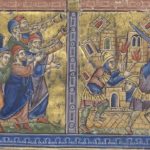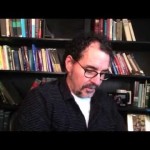We run our website the way we wished the whole internet worked: we provide high quality original content with no ads. We are funded solely by your direct support. Please consider supporting this project.

Doubt as a Companion to Faith
A true and living faith is never a destination; it’s a journey. And to move forward on this journey we need doubt. Faith is not based on certainty. Think of it this way. We often cling to certainty-seeking faith like one might a map as if the map itself is actually the territory. But our “map” of God is never the complete and fully truthful reflection of the territory. We can only be genuinely open to going deeper with God if we hold our maps in a flexible way.
This kind of openness recognizes the benefit of doubt. This kind of doubt makes room for us to struggle on the inside of our relationship with Jesus because our faith is not found in how certain we are, but in the faithfulness of Christ.
Exploring the doubts we might have inside this relationship allows us to be honest, open, and as objective as possible as we work through issues without fear that the faithful love of Christ for us hangs in the balance. And the freedom to explore these kinds of doubts makes us adept at remaining humble as we remember that our maps are always limited and tentative, whether we are talking about our relationship with God or other people. The map is not the territory.
With our confidence in the faithful love of the self-sacrificial character that Jesus displayed on the cross, exploring doubts can free us to honestly explore our map for ourselves. Knowing how easy it is to be self-deceived, this kind of doubt allows us to explore whether we really believe what we say we believe.
More importantly, it empowers us to better relate to God, whose perspective is always further beyond our own than the stars are beyond us. Doubts that you explore within your relationship with Jesus can give you the space to wrestle toward an ever-deepening, increasingly intimate relationship with another. Doubt is not the enemy of faith. It’s a much-needed companion.
If you’re among those who have felt the need to try to avoid doubt and strive for certainty, if you are among those whose security has been wrapped up in a commitment you made at some point in the past that you thought “sealed the deal” between you and God, or if you are one of those many who embraced the idea that faith is an invisible thing that has no necessary connection to how you live, day in and day out, maybe it’s time you consider a reframe. Maybe it’s time to let go of the certainty of your map and embrace the relationship.
—Adapted from Benefit of the Doubt, pages 150-152
Image by Alex Siale via Unsplash
Related Reading

Reading the Bible “by Faith”
The cruciform approach to reading the Bible—and specifically the culturally-conditioned and sin-stained portraits of God—requires faith on the part of the reader, which I argue in Crucifixion of the Warrior God. On one level we can discern by faith that often times God broke through the limitations and sin of the ancient authors, for we…

Dallas Willard on Doubt and Belief
http://youtu.be/xiOIyP4VHOk One of our Facebook friends pointed out this video to us (Thanks Lukasz!) The comments in this interview on the benefits of fellowship when it comes to doubt and belief are excellent. We’re really going to miss Dallas.

The End and Beginning of Faith
Eduardo Amorim via Compfight Micah J. Murray shared the story of how his doubts and loss of faith led him to a truer, deeper faith. While we fear the doubts that sometimes sneak in, sometimes those doubts lead us to a place of goodness. Be not afraid. From Micah’s story: Eventually I gave up on…

The Good News That’s Really “Good”
Often we view our relationship with God in terms of a legal contract. For instance, people often ask questions about salvation in this way. They see God as the judge, we are defendants, and salvation is about staying out of prison. With this perspective, questions about salvation and the Gospel—which means “good news”—are about the…

Drum Roll Please: Greg’s Final Critique of Bart Ehrman’s Article
This is the ninth and final of several videos Greg put together to refute Bart Ehrman’s claims published in the article What Do We Really Know About Jesus? Thanks for hanging in there for this last one. I know it was a long wait, but the holidays got inordinately busy for Greg. In this segment, Greg talks…

Video Q&A: Faith and the Historical Jesus
Greg is trying something new in order to answer more of your questions. He’s going to be taping himself addressing your questions with no polish of any kind: raw and unedited. You’ll notice in this first one that he’s pretty low in the frame of the camera, and we’ll be tweaking this as we go,…
